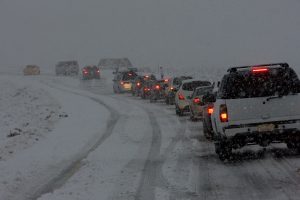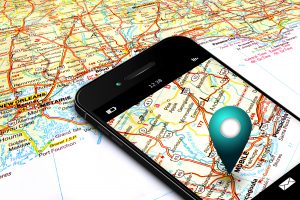At 1PM Monday January 3rd, 2022, Senator Tim Kaine started his 2-hour commute from his Virginia home to Washington DC. This 2-hour commute turned into a 27-hour ordeal. A surprise blizzard, dumping about a foot of snow paralyzed both lanes of traffic on Interstate 55, causing hundreds of motorists to be stranded along one of the East Coasts busiest thoroughfares. Senator Kaine stated he had a warm coat and a full tank of gas. He also stated he hadn’t had anything to eat except an orange that a family coming back from Florida was handing out from the box of oranges that they had picked up while vacationing.
Senator Kaine was in a highly traveled route, one where you would not expect that traffic could be at a standstill for over 24 hours. Luckily, no one needed medical care during this ordeal. It could have turned out disastrous.

Moral of this story: A weather emergency can happen to anyone, anytime, anywhere.
Commuting, whether by car, bus, subway, train, or bike can have unexpected emergencies that can spell disaster for the unprepared.
Just because your travels take you through highly populated areas doesn’t make you immune to the perils of adverse weather events.
Winter travel can be life threatening, especially if you haven’t prepared.
In high rainfall areas flooding is common. Roads can be swept away from flood waters; rivers can overrun their banks. Mudslides can close roads. High winds can knock down power lines and tip over high sided vehicles. Fog limits visibility and can be treacherous. Avalanches are also a danger. While driving home 2 men were caught in an avalanche that buried their car. Luckily, they had cellphone service and were able to call for help.
Medical preparedness extends beyond what is in your medicine cabinet (which is important). In the case of cold weather, being prepared is essential.
At home you are in a much more stable environment compared to travel. Hopefully you have thought about what to do if your lights and source of heat are out for an extended time due to a weather event (ice storm, high winds, tornado, hurricane, etc.) If not, take a few minutes to note and make a list of what you may need. There are many lists and advice on the internet. So, I won’t go into too much detail. However, a home based medical supply list should include:
- Basic first aid kit
- Prescription medication and a way to prepare and take it
- Flashlights with extra batteries (Headlamps are handy, it frees hands for other chores, especially in a medical emergency)
- A safe way to stay warm (indoor safe propane heater, for instance)
- Backup power for anyone on oxygen or cpap or other medical devices.
Even a last-minute trip to the grocery store before a storm can prove life threatening.

If you must drive in this weather there are some apps you can download to your phone that could help you decide if, when and best route to take. These should only be used for areas with strong cell phone coverage. An essential item for anyone traveling in rural or spotty cellphone areas is the Garmin GPS. These devices were issued to staff at my place of employment when I worked in rural Idaho. These and devices like these are used by backwoods skiers, hikers, and rural workers. These devices use satellites and can send a SOS signal to whomever you set them up for, along with EMS services.
A few well thought out items can mean the difference between life and death when traveling. Not having a change of socks after stepping out of the vehicle to clear snow from the exhaust can lead to hypothermia. Know the signs of hypothermia and what to do.
Skipped medications can also be life threatening.
Action Plan:
Inventory your car, take note of what you have and what you need to get prepared. If your main source of travel is subway or bus, dedicate a small backpack to items necessary to wait out an emergency if transportation comes to a halt for an extended period of time.
Some travel items to include would be:
Note- if traveling on public transportation you won’t be able to carry all items listed, nor will you need to. A small pack with extra meds, drinks, food, and a flashlight may be all you need. Consider your own situation and take it from there)
- Laminated maps of area traveling (If leaving area and unfamiliar with where you are headed)
- GPS tracker
- Cellphone with recharger and/or extra battery
- A few days’ worth of medications and way to administer (insulin vial, syringe, etc.)
- Snack bars and boxed juices, bottled water
- Extra pair of socks, shoes, hats, and gloves
- Hand warmers
- Raincoat or poncho
- Headlamp and flashlights with batteries
- Basic first aid kit
- If traveling with child still in diapers make sure have extra, plus wipes
- Whistles with lanyard to signal for help
- Extra blankets, sleeping bags, etc.
- Tow strap
- LED road flares
- Shovel and small bag of kitty litter for under wheels stuck on ice
A few other considerations:
- Let someone know where you are going, route and when expected to arrive.
- Take into consideration passengers if traveling by car. Ages, needs, and if stranded for long period of time activities like color books, etc. for children.
- Remember to always try to keep your gas tank at least half full. Even short commutes can turn treacherous. Inclement weather can cause gas shortages.
- Top off windshield wiper fluid, use fluid rated for below freezing weather.
- Avoid rushing to the grocer during weather events by keeping pantry well stocked.
